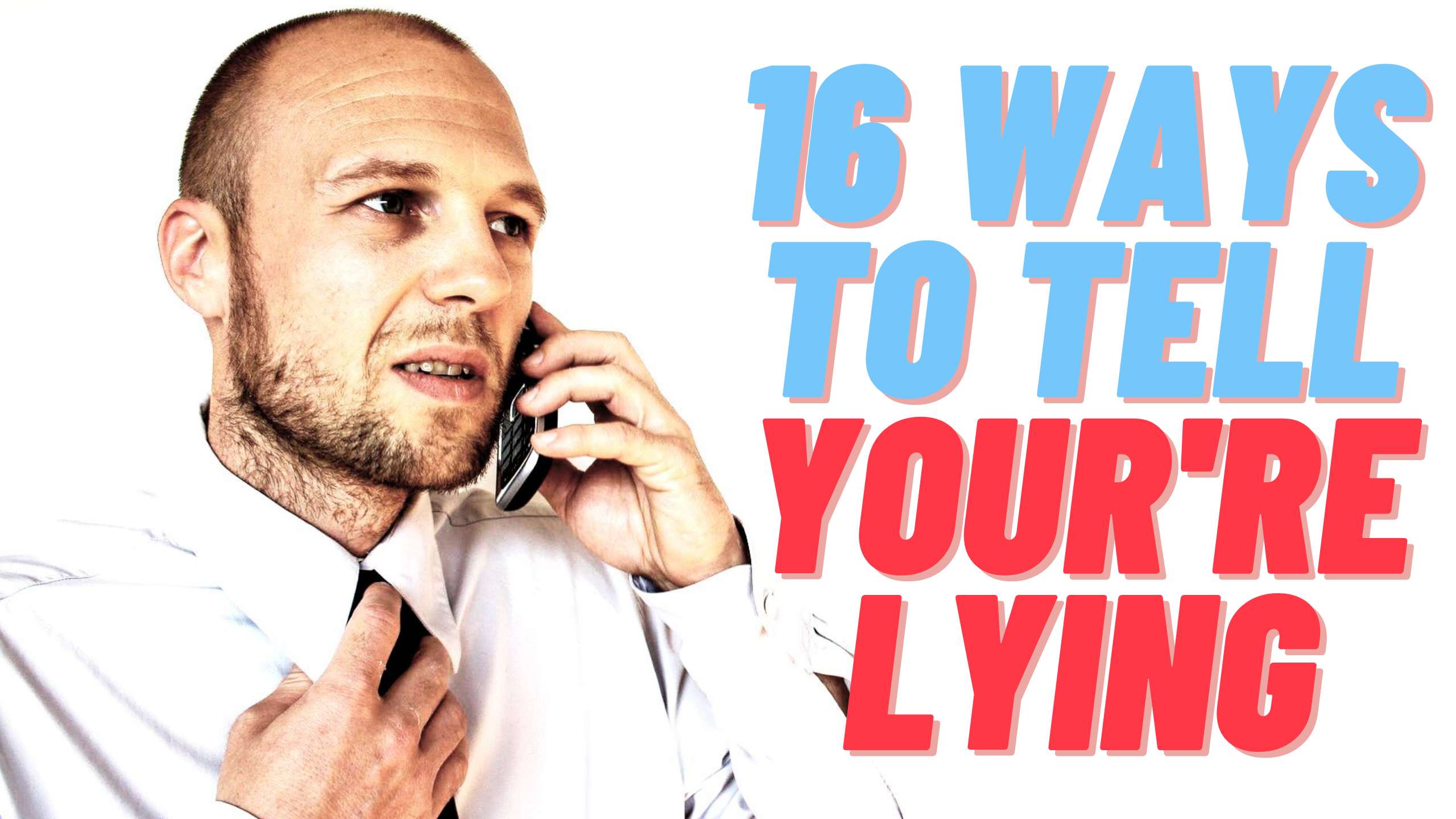Intro
Lies come in two forms:
Lies people tell you, and Lies you tell yourself.
This week we will explore exactly how to spot a lie that other people tell you.
Next week we will look at lies we tell ourselves.
Deception is a hard one to spot, but if you look at the right signs, it may be easier than you think.
Being a human lie detector sounds like it takes superpowers to detect, but it's totally achievable. There's no sure-fire way outside of a lie detector test. Pay careful attention to the person's story and how they tell it.
These "16 Ways To Tell You're Lying" will definitely get you started.
1

Here is the first sign to look for.
Liars may want to hide their face while they are talking to you. They may put their hand over their mouth or look away to prevent you from seeing their eyes.
They may not totally cover their eyes or mouth, but they may frequently touch their lips so their hands cover most of their mouth.
These acts may be signs that you are being told untruths.
2
Look For A Fake Smile

You've seen that fake smile where the lip are tight from trying to hide real facial expressions.
When someone give a real smile you can tell because it will cause a type of crow's feet around the eyes.
A liar may press their lips together in a tight smile that doesn't reach their eyes.
You can tell when it's not sincere.
3
Watch For Rapid Blinking

You would think that looking a person in the eye is the sure-fire way to tell if they are lying, but some people are so good at lying, they can look you straight in the eyes and lie like you wouldn't believe.
Studies show that eye contact has nothing to do with truthfulness, but that doesn’t mean a person's eyes can’t give them away.
When you ask them a question and they suddenly start blinking faster, they are probably lying.
Their blinking patterns may be a dead giveaway.
4
Notice If They’re Chewing On Their Lip

Take notice of someone is chewing or biting on their bottom lip. Someone who is spouting lies may feel super self-conscious about their mouth.
Also, lying makes people feel nervous, and to relieve the stress, they bite their lip or make chewing motions on the bottom.
Ask them a question and watch the way they move their lips.
5
Look For Flared Nostrils

Start questioning a liar about the details of their lie and them watch their nostrils.
Flared nostrils are a micro-expression that might mean a person is lying. It could also mean that the person is angry that you are asking them questions they don't want to answer.
Most of the times they flair because they don't want you to catch them in a lie.
6
Check If The Person Is Sweating When It’s Not Hot

I know you've hear the expression "Getting hot under the collar." When some people get nervous they start sweating especially when it's not even hot.
Check to see if a person is sweating. Look at around their lips, at their temples, or at their underarm area to see if they're sweating.
People start sweating around their temples and hairline the most frequently. This may be a little harder to detect, but keep an eye out for it.
7
Notice If They’re Playing With Their Hair Or Beard

Take note if you see them twirling their hair or running their fingers through their hair.
If they are twirling their hair around their fingers or starting to play with the ends, if they have long hair, it's probably because the person is telling a lie.
If they have facial hair, like a beard, they may start rubbing it, or playing with it throughout the conversation.
8
Watch Their Hands To See If They Hide Them Or Fidget

Where are the person's hands?
A person who’s lying will likely have trouble making normal hand gestures, and in some cases, they feel like they need to hide their hands completely.
Are their hands buried in their pockets, or are they constantly wringing them? They may get fidgety and cracking their knuckle.
Observe their hands to see if the movements are unusual.
9
Listen For A Change In The Person’s Tone Of Voice

Say someone is telling you a story about where they went last night and suddenly their voice get really high, start really paying attention to what they are saying.
Lying makes you feel nervous, so your body may tense up causing your voice to change. The tone could got up or down, but you will definitely notice a change in tone.
Consider that any changes in tone are a possible sign that they may have started telling you a lie.
10
Notice If Their Speech Speeds Up Or Slows Down

If a person is firing of words faster than a bullet leaving a pistol, you may be getting a story that has been rehearsed in their mind. All they want to do is hurry up and get it out.
Let it flow and then ask them a pointed question. If the rapid fire speech slows down to a crawl, you have just witnessed a lie.
A liar may slow down their speech while they think up their lie, but they may speak faster when repeating a rehearsed story.
The pace in which a person talks is a sure way to detect when something isn't adding up. A smooth steady flow is one thing, but when you get the high speed avalanche followed by periods of slow discourse, you are probably listening to a bunch of lies.
11
Look For Changes In Their Sentence Structure

Typically, a liar will change the way they tell the lie as they get more comfortable with their story. You may notice sentence fragments when they’re trying to make things up.
On the other hand, they may switch to more complex or run-on sentences as they try to convince you of their story. Pay attention if the person suddenly swings between short, incomplete sentences and very long, complex sentences.
As an example, they might start out with statements like, “Just me,” “At school,” and “Right home.” Later, you might notice sentences like, “I was totally alone last night, you can check with my friends. It was just me there, so there’s no reason to be suspicious.”
12
Press Them For More Details To See If They Can Elaborate On Their Story

As you listen to someone share a story that is made up, they will struggle to fill in the specific details about the event.
When you ask for more information and they add very little, you may be getting a snow job.
Time to go into cross-examination mode.
Throw in some questions that require detailed answers, especially if you know exactly what those details are.
13

They say timing is everything. People normally take a moment to think about the answer to a question before they give it.
However, a person who’s lying will often answer right away. Why is that? As stated previously, because they’ve rehearsed their answers in their mind. and can't wait to get it out.
Put them to the test by asking the person several questions in a row to see if they take time to think about it or answer right away. If they seem to have all of the answers, they might be lying to you.
For example, you might ask questions like, “What happened after that?” “Who else was there?” “Where were you before that?” or “Can you describe the scene?”
If the person gives a short, non-detailed answer that covers a long period of time, it may be a sign they’re lying.
14
Use Open-ended Questions To Trip Up A Liar

Sometimes the best move to catch a liar is to let them talk themselves into their own grave. Open-ended questions force the person to add onto their story.
That means they will have to keep adding to their lie the more they talk. This is hard work for them, and it also digs their hole deeper and deeper.
Pepper the person with questions that require more than a yes/no answer.
You might ask, "Who else was there?" instead of "Were you alone?" or "What classes did you take last semester?" rather than "Were you a student last semester?"
Sooner or later you will trip up a person who's making things up.
15
Get The Person To Tell Their Story In Reverse So You Can Check For Inconsistencies

Now if you really want to have some fun, ask a potential liar to tell you their story again, but this time, tell it in reverse.
You might say something like, "Can you tell me what happened again, but start from the end and go backward?"
Liars may be really good at telling a rehearsed lie, but asking them to tell it backward usually trips them up.
When a person is telling the truth, they can recount their memories with no problem. However, a liar will have to work extra hard to reconstruct their lie.
16
Notice If They’re Repeating Your Questions

If you're lying on the spot and need some time to think, use the tried and true method to buy some time: Compliment the question.
Listen for statements like, “That’s a good question,” or “Thank you for asking that.”
Be on the lookout for this tactic.
Another tactic to gain some thinking time is to repeat the question before you answer it.
Be on alert if a person keeps doing this, as they might be buying time to fabricate a lie.
Conclusion

Being deceived is not a fun thing to go through, so if you can detect them early, you can cut them off before they do more damage.
These 16 ways to tell if you're being lied to will help you spot a liar a mile away.
It takes a lot of observation to detect the nuances that liars use to hide the truth from you, but you can learn to master the telltale signs.
The more techniques you know, the easier it is to read the signs.
Next we will cover the techniques to tell if you are lying to yourself.
See you then.
Question?
What is the best technique you've used to catch someone in a lie?
(Tell me in the comments below.)
Watch This for Some More Motivation
"Set Yourself Up For Success"


Get the latest tips first.
Join Our Mailing List.
Sign Up Today!
Albert Powell
Thank You
Hope it helps you in some way.
Please post a comment below, and let me know what you think.
Share it with the Super Achievers you know, and join our mailing list for more helpful tips.
The information you share with someone could be the difference between success and failure in their life.
And remember,
"Make something great happen today."


Excellent goods from you, man. I have understand your stuff previous to and you’re just too great. I actually like what you have acquired here, really like what you’re saying and the way in which you say it. You make it entertaining and you still take care of to keep it sensible. I can’t wait to read much more from you. This is really a wonderful site.